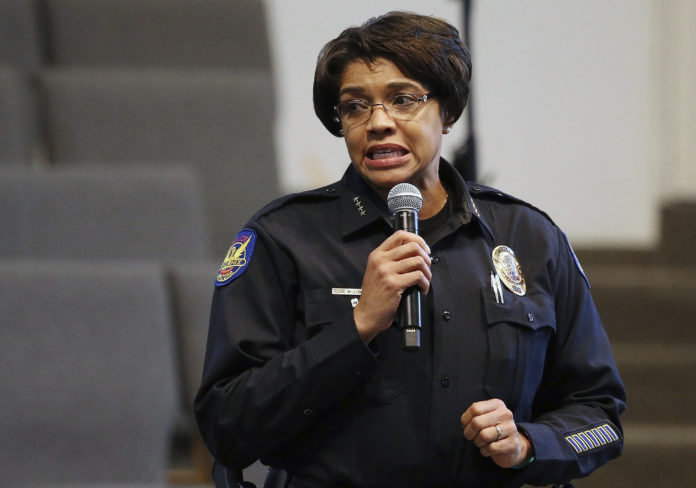
Phoenix Police Chief Jeri Williams was given a one-day suspension after lawyers hired by the city issued a report that heavily criticized her agency’s role in a now-discredited gang case against demonstrators last fall at a protest against police brutality.
The report released Thursday said the decision to charge 15 protesters with assisting a street gang was made without seeking input from Phoenix police’s gang enforcement unit. It also said the agency didn’t have credible evidence to support the claim that the protesters were members of an anti-police gang called “ACAB,” meaning “All Cops Are Bastards.”
Concluding that ACAB is a slogan rather than a group, the outside lawyers said they “found no credible evidence to support the assertion that ACAB is a criminal street gang, that it organized the protest of October 17, or was prone to violence.”
The gang charges were later dismissed at the request of prosecutors. The city is asking the Arizona Attorney General’s Office to investigate any criminal matters arising from the report.
Three assistant chiefs were removed from those roles, and a sergeant at the center of the report was put on administrative leave.
The report came a week after the U.S. Department of Justice announced a widespread investigation of the Phoenix Police Department to examine whether officers have been using excessive force and abusing people experiencing homelessness.
The probe also will examine whether police have engaged in discriminatory policing practices and will work to determine if officers have retaliated against people engaged in protected First Amendment activities. The police force has come under fire in recent years for its handling of protests and the high number of shootings.
In another new report on police actions after a protest, the law firm hired by the city also examined a “challenge coin” circulating among Phoenix officers that depicted a gas mask-wearing demonstrator getting shot in the groin with a pepper ball and contains a vulgar comment about his injury.
The image on the police souvenir closely resembled a protester who was shot with a pepper ball during a 2017 protest outside a rally held by then-President Donald Trump in downtown Phoenix. Video of the encounter, which also showed the protester kicking a smoke canister back at police officers, became viral on social media.
The lawyers said they couldn’t determine who created the coin but noted it was circulated among officers in late 2017 while they were on city property and on the clock. A second slogan on the coin was supportive of Trump. Internal investigations are being conducted into the circulation of the coin.
In an interview, City Manager Ed Zuercher, who disciplined Williams, acknowledged that the reports portray Phoenix police as having a problem with protesters who are exercising their free-speech rights. He said Williams will reemphasize that the agency is committed to protecting those rights.
Zuercher defended his decision to suspend Williams for only one day, noting the reports found the police chief wasn’t aware of the gang charges until after they were filed and didn’t learn of the challenge coin’s existence until she was asked about it in a deposition in August 2019. The deposition was part of a lawsuit that alleged Phoenix police violated the free-speech rights of the protesters outside the 2017 Trump rally.
Zuercher said the chief is now holding employees accountable for their actions. “She is from the community,” Zuercher said. “And she is the right chief to continue reforming this department.”
The city’s outside lawyers concluded the decision to charge protesters was made by Phoenix police and prosecutors at the Maricopa County Attorney’s Office.
“We further found that police and prosecutors ignored expert-established criteria for identifying true criminal street gangs and similarly ignored established protocol for processing the gang classification,” the report said. “Instead, police began considering anti-police protestors generally as ‘criminal street gangs’ based upon statements by a source of highly questionable credibility.”
The police department and the county attorney’s office didn’t return messages seeking comment.
Republished with the permission of the Associated Press.













